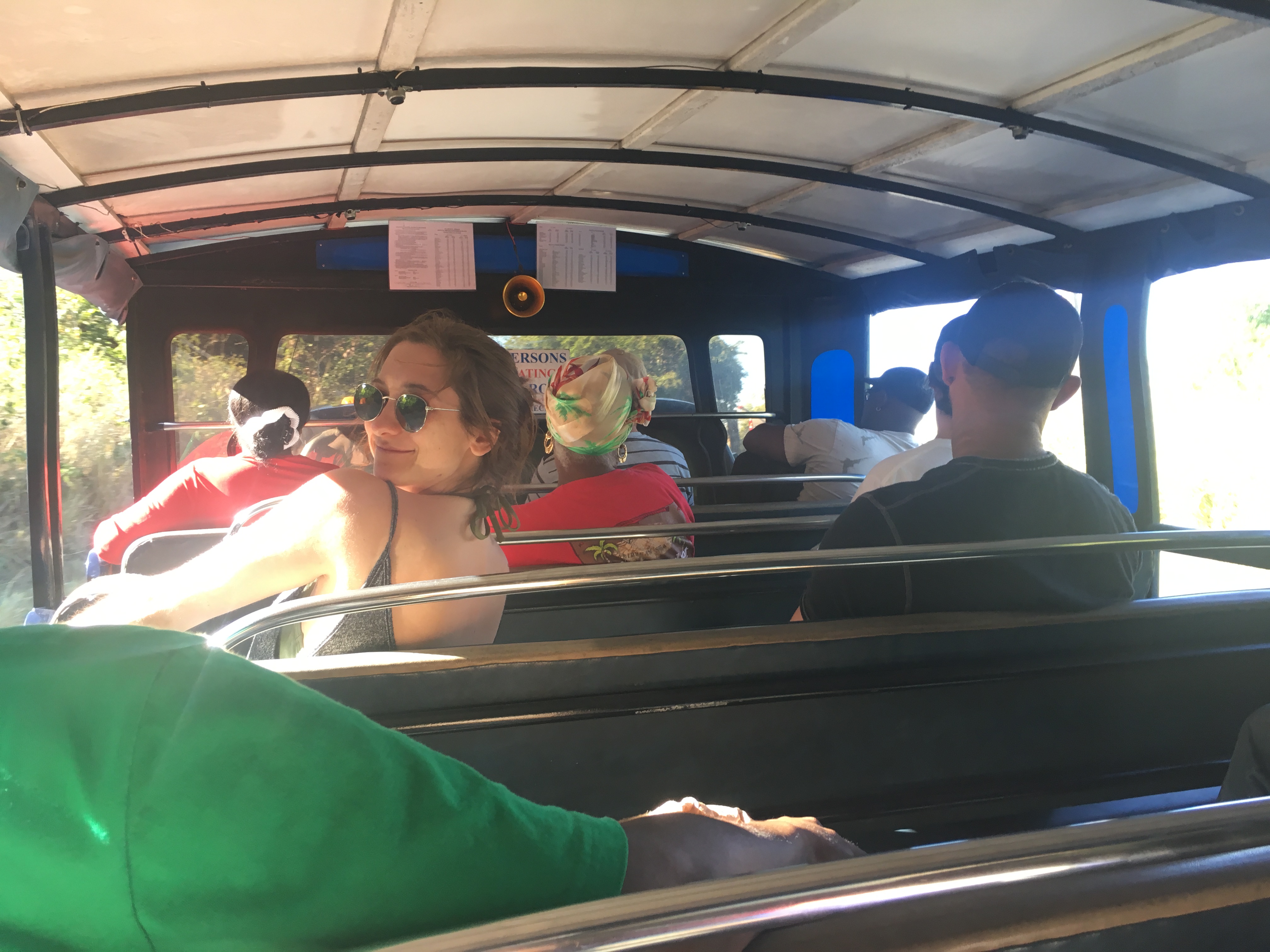Living in the Virgin Islands, it’s a different culture. In fact, it’s a lot of different cultures. I see it every day when I’m catching a Safari, which is the public transport open-air trucks that zip me to where I need to go for $2. Some times when I’m waiting at the Safari stop, I’ll see one approaching and put out my arm to wave it down. But it doesn’t stop. Why?
“I see white people.” That is, it’s filled with white tourists and not the every day working

Here’s my cousin Katherine as the only other white person on the Safari.
people who I normally sit next to. Those vehicles cost 10 times as much as what I and every other working stiff on island is used to paying. The drivers, somehow, can spot the difference between me and the tourist.
Of the approximately 50,000 people who live here, most are black people who are collectively known as “West Indians.” I am new enough that I can’t really tell the difference, but there are many. There are those who are locally born and raised, and then there are those from Jamaica, St. Lucia, Dominican Republic, St. Kitts, Trinidad and elsewhere. One time I was on a Safari with a woman who obviously felt late for the ferry, and she started screaming at a women who, she thought, was making her even later. She ended her rant with, “I’m from St. Lucia! You all need to know this!”
So many differences, just in our neighbors. And, if you look for it, you can find even more differences. For example, if I enter a store and do not say “Good morning” or “Good afternoon,” or the odd greeting of “Good night,” then I am ignored. It doesn’t matter what color I am; I’m considered rude if I do not say these magic words. It’s pretty easy to find people with a big chip on their shoulder here. There are so many people who have been done wrong and are now simply waiting for the next shoe to drop. These folks are protecting themselves by building walls.
This isn’t my style. I greatly prefer to find the similarities in people. For example, I am friends with a group of West Indians who hang out by their trucks near the corner where I turn to walk back to my apartment. These guys are really nice. Curtis sells beers and rum infused with greens (he calls it bush rum, and it is STRONG); even though I try to pay him when he offers me a shot, he never accepts my money. Instead, he accepts my conversation and smile. Maxim owns the Laundromat in town. He is a kind, older man who was shelling peas one day as we chatted about health. It seems he has fallen arches, which cause him a lot of pain. But we talked about our relationship with God, and when I saw him after his doctor appointment, we hugged at the news that he was otherwise completely healthy. Peter works construction with Curtis. He laughed when I told him about how I used to work at This Old House magazine, and part of my job, as a 20-year-old, was to answer Bob Villa’s emails. I met a Rasta named Yellow. We have a mutual

See Curtis on the right. He led me over to this truck of awesome, farm-fresh cucumbers, which he pronounced “kookaburras.”
friend.
Another thing in common? The love of good, local food. So when the truck pulled up with buckets of freshly picked cucumbers, they led me right over to buy some with them. In their accent, they pronounced cucumbers as “kookaburras.” Yet another example of how differences are actually similarities.
I like looking for the same, because it’s everywhere. A hatred of the current president. The love of the ocean. The belief in helping others and finding joy in life. We all want this, regardless of what we look like, where we came from and how we pronounce “cucumbers.”
So, do you find yourself looking for differences or sameness? Are you fearful of those who are different than you? Because difference can be scary. We don’t know the culture, what they expect or think. Who knows how their mamas raised them. I’ve met many people, though, who seem a lot like me, and I come to find out their mamas didn’t raise them right at all.
I encourage you to look around at people you meet and decide they are just like you. As a newspaper journalist, I quickly realized that the janitors, secretaries, bailiffs and other marginalized people were much more important to my work than those who carried a title. I made it a point to address politicians by their first names, just like I did their assistants. I want to view everyone as equal to me, because they are.
It’s lazy to decide that one person is different or better because of something as simple as looks or style. I’d much rather expand my world by accepting different types of people into my life. That’s why I’m constantly looking for the same. Because we are all one, aren’t we? We’re all part of this beautiful universe, working together to provide each other opportunities for growth. So those who challenge me and those who support me, I thank you both. To me, you are friends on my path, and we are the same.
